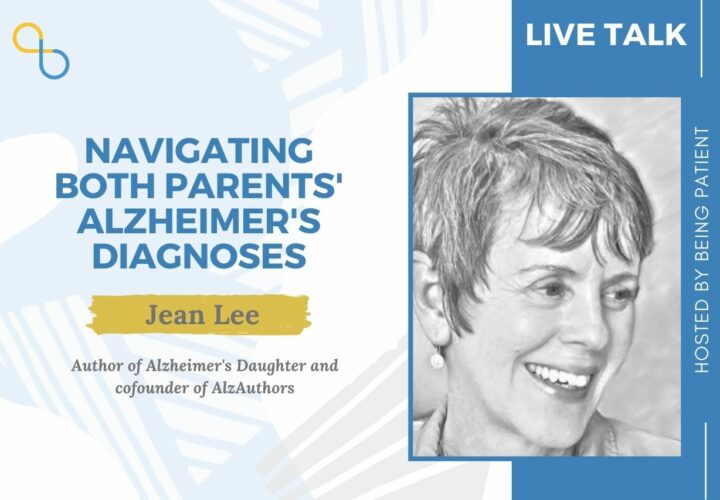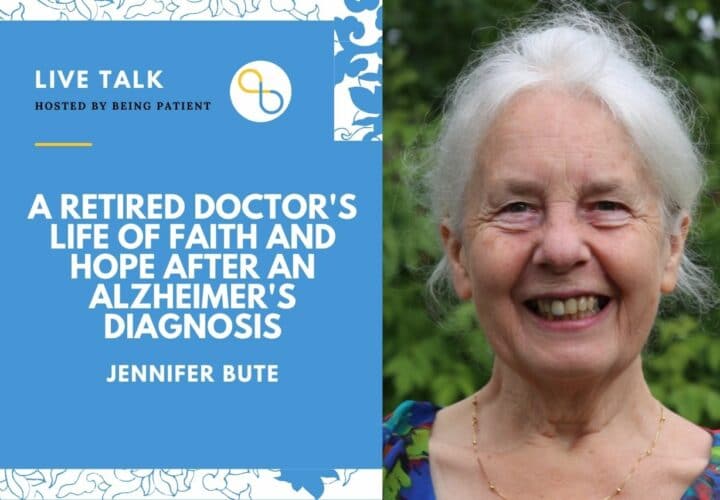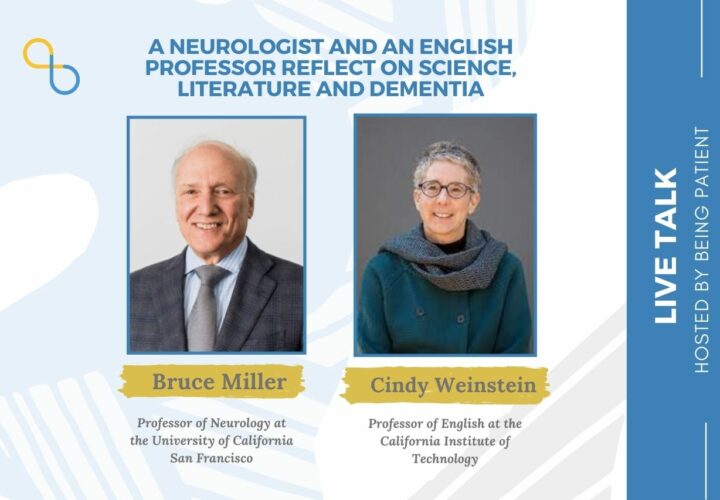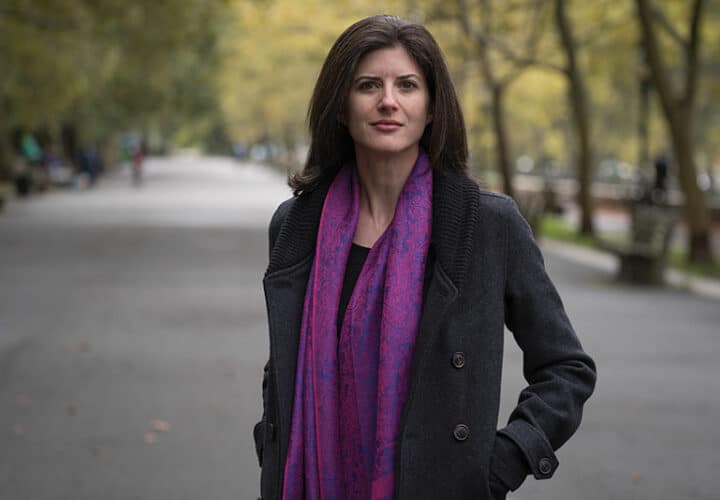Jean Lee, cofounder of AlzAuthors, speaks out about her parents' love story, their decline in the face of Alzheimer's and how she reconciled the guilt of writing such an intimate account of their dual diagnosis in the book Alzheimer's Daughter.
Jean Lee remembers her late parents for who they were in their essence, a loving and positive couple who raised her with faith and gratitude. Despite the challenges that came with their dual diagnosis of Alzheimer’s, she sees their parallel decline as a blessing in a way, enabling them to weather through the disease hand-in-hand as they lived out their love story from the beginning to the end.
Being Patient spoke with Lee, author of Alzheimer’s Daughter (2015), about the bond between her mother and father, how her family coped when they were both diagnosed with Alzheimer’s in 2006 at the age of 86, and what inspired her to cofound AlzAuthors, a nonprofit organization that shares authors’ personal stories about dementia.
Being Patient: How did your parents first meet each other?
Jean Lee: They went to high school together. However, they were not high school sweethearts. As I understand it, they were in a senior play together and after [graduation], Dad was leaving for the military.
The book (Alzheimer’s Daughter) opens with the first love letter where my mom is writing to my dad as he has left for the Army; she [says], ‘I wish I had understood how special you were to me. I wish I’d been able to tell you that before you left but please know that now.’ That was in 1941. They married in 1944.
It was such an unbelievable find to find their World War II love letters and to be able to use those as chapter beginnings to show their young love [that] remained strong throughout the disease, which took parts of them away. It never took away that love between the two of them though. They were such a special, sweet couple.
I’m so lucky to have been raised by them. It was [so] natural to see my dad’s arm around my mom and her head snuggled into his shoulder. It was a love story from the beginning and stayed that way until the very end.
“It was a love story from the beginning
and stayed that way until the very end.”
Being Patient: How did you feel when you found this box of love letters at your parents’ home after they had moved to a retirement community?
Jean Lee: Those were some of the darkest days of my life. I was working full-time as [an] elementary school teacher and I’d go back to the house every night. It had become a house [with] trash bag after trash bag of things that I was trying to sort. I could not distinguish what was treasure from what was trash. Because of that, most [things] went to trash. It was so overwhelming.
Within that dark time and the frustration of ‘Why did they keep all this stuff?,’ and the months of cleaning that out, I came upon this little gold box in the corner of a closet. It was a cardboard box that had gold foil on it. I thought, ‘Oh boy, what’s in here? I’ve never seen this before.’ I picked it up and it jingled and I opened it. My dad’s dog tags were laying on the top and the letters were stacked in order like little files in a file cabinet. I read a couple of them and I realized these [were] my parents’ love letters. It took my breath away.
I took [the letters] home and my sister, who had been my constant support through all of this even though I lived in Ohio and she lived in Florida, came home and tried to help me. I showed this box to her. She looked at a couple of letters. We decided we [could not] look at these. These [were] private. So we took them to our mom and dad at the retirement community and we kept moving the box with them until my [mom] and dad died.
We actually brought that box home, still committed to not reading them, and dumped them in my trash. My sister said, ‘Let’s just peek.’ We started pulling them out of the trash one by one, reading them [and putting] them in order. That’s how they were found and how they came to be published.
Being Patient: You began journaling about your parents’ symptoms in 2003. Can you share with us some of the early symptoms of the disease that both your parents experienced?
Jean Lee: My sister lived 1,000 miles away, but had always remained close to our family [and] came home at least twice a year. But as we started to notice changes, I would call her and say ‘Wow, this week these really weird things happened.’ She was the one who said, ‘Jean, would you start writing these down [and] start keeping a journal so that you can tell me dates [and] frequencies?’
I felt so guilty writing it that I threw it in the bottom of a junk drawer and prefaced it saying, ‘I’m only writing these things in case they could be helpful for diagnosis.’
My mom had always been a keeper of things, [and] saved every butter tub and random lid. But the house became so cluttered the stove couldn’t be used. My dad had been the organized one, but he started accumulating clutter [and] not [being] able to find his checkbook. Eventually, bills weren’t being paid.
[There was] a lack of organization and logical thought. There were times that they got lost on the highway. They went places and got separated from one another with no care about [how they were going to find each other later]. It was as though God intervened and brought them back together.
There were idiosyncrasies that are talked about in that journal, and I’ve had lots of reviewers and people say, ‘You gave me tips about what to watch for in the progression of the disease.’
Being Patient: Your husband also noticed your dad’s symptoms as they worked together at a real estate company.
Jean Lee: That was so delicate. He would come home and say, ‘This wasn’t right,’ or ‘I’m worried about Dad.’ My dad loved working. He thrived on it. But the day that diagnosis was delivered, the doctor wrote three prescriptions: ‘You will give notice and retire in two weeks. You will move from your home or accept some kind of support in your home. And you will stop driving.’ It was a triple whammy to this man who had been so independent.
Being Patient: How did your parents react to their diagnoses?
Jean Lee: There were two appointments. On the first appointment, they didn’t want to get in the car with me at all and I had my journal wrapped up in a raincoat so they wouldn’t see what it was.
The social worker who worked in that office wanted to see the journal and the timeline of the progression. While she was meeting with me, [my parents] were meeting with other professionals who [were] giving them diagnostic tests. From having not wanted to go, they came out of that first appointment exuberant. They thought they had played games. They had so much fun. They hugged the doctors.
Then we had an appointment for six weeks later where the results of the testing would be revealed. We went back for the appointment. The doctor, who they had hugged and loved, told them that they both had Alzheimer’s and delivered the three prescriptions, [and] my sister was on speakerphone.
I’ve never seen my positive dad so full of anger. I really thought he was going to stand up and fight the doctor. My mother was like, ‘How can you say this to us? We are capable people.’
After we came home from that appointment, I would refer to those doctor’s prescriptions in the coming weeks. Because they were written on a prescription pad, Mom and Dad thought, ‘Okay, this is [the] law. We will do this.’
But the word “Alzheimer’s” was never spoken again in our family. As time went on, it was so hurtful for them both to hear that they didn’t need to hear it again.
Being Patient: After their diagnoses, your parents moved into a retirement community. What was the community like and how did they adapt?
Jean Lee: It was a Masonic community and my dad had been a Mason since he was 18 years old. He had contributed to the building of this community so he had a friendly feel about it.
[On] the day of the move, he was very sad and dejected to leave his home. He hardly spoke. My mother, at that point, was propping him up because she knew there were so many changes happening for him.
We got them there. We had dinner. There was an organization that removed key furniture from the house and arranged it in that apartment so it looked familiar. Leaving that night with my sister, we were so torn up as we walked away. We turned and looked as they were both up in the window, arms around each other waving at us and blowing us kisses, [as if saying], ‘This is going to be okay. We’re going to make the best of it,’ and they did.
They did adapt. My dad had worked so long that my mom had always wanted more time with him. They enjoyed that time together. They enjoyed visiting people, until things got bad and they couldn’t figure out which apartment was their own.
They lasted in independent living [for] about 18 months and then had to be moved to assisted living. Eventually, [they moved] to a different facility that had a memory care secure unit.
Being Patient: Their move to the locked memory care unit must have been another difficult chapter of this journey.
Jean Lee: It was so hard to visit and leave, and have them see me approach those locked doors. I really did feel as though I was leaving them in a prison and they had committed no crime. They were such innocent little lambs at that point. It was excruciating for them and for me, because they would want to follow me [as I left] and they couldn’t.
Being Patient: Shortly after your parents moved to the locked memory care unit, your son got married and your parents couldn’t attend the wedding. But your son and his wife decided to host another wedding at the home church where your parents could attend the service. The family also celebrated their upcoming wedding anniversary and the birth of their great grandchild. There must have been so many mixed emotions during that time. Can you tell us more about these events?
Jean Lee: Being that my sister lived so far away and that we were both teachers, we knew we had to accomplish this move to the secure unit over Christmas break. My son and his wife were going to be married on New Year’s Eve that Christmas. This was all within a week’s time. We shuffled [my parents] to the new facility. We cleaned out [the assisted living] apartment. Once again, things went to trash or Salvation Army. We were bruised emotionally [and] physically.
This wonderful wedding was coming up. We were all so excited. My sister’s family was coming from far away. It was the contrast of deep sadness in the family and wonderful joy too. Within that joy was that we couldn’t take Mom and Dad to that wedding because it was about three hours away.
The day after my son and [his wife’s marriage], they came home to [the] little home church and had a wedding ceremony for [my parents] with our home pastor. That was on New Year’s day. My parents’ wedding anniversary was coming up in two weeks, which we celebrated, and my niece was expecting [my parents’] great grandchild. Those three events all converged in this deeply sad time for us.
We don’t get to pick times that we are exclusively sad or exclusively happy. They intermingle.
Being Patient: You wrote that you remember your parents as they were at their core. What do you mean by that?
Jean Lee: I was so lucky that they were happy people who raised me with faith and taught me to actively count my blessings, because that’s who they were at their core. The core does not change. Had they been negative people in their lives, that might have overwhelmed them at the end. But because they were always positive people, that was their core, and it remained so.
“I was so lucky that they were happy people who
raised me with faith and taught me to actively count
my blessings, because that’s who they were
at their core. The core does not change.”
They were diagnosed together and declined together. It was terrible to endure, but it was almost better that it did happen together, because they remained connected and positive together. My sister and I occasionally became the bad guys. Disagreements were pointed toward my sister and I, and we could take it. It allowed them to remain the loving couple that they had always been at their core and the positive people they had always been.
Being Patient: How did AlzAuthors come about after you published your book?
Jean Lee: I was very insecure about having published it. Through the journey, reading the stories of others sustained me. It made me think, ‘Other people have survived this, so can I. I can get up in the morning, stand on my feet, breathe and walk, [and] keep going forward.’
One of those books that I read was Marianne Sciucco’s Blue Hydrangeas. She’s a nurse and [the book] is fiction. She had written it about her care of the elderly, a beautiful story also about a couple. After I started gaining a couple of positive reviews, I had thought so much of her and her book. I thought, ‘I’m going to put my book in an envelope and send it to her.’ I was sure she would be too busy to look at it and throw it in the trash.
I got an email from her not long after and a call, and she said, ‘I love your book. Will you work with me to gather titles written through personal experience with Alzheimer’s and dementia to support other people who are currently on this journey?’ I was like, ‘Of course I will.’ She said, ‘Who else have you read?’ At that time, I had read Vicky Tapia’s Somebody Stole My Iron, and we reached out to her. That was in 2015.
Now we have over 300 books in our bookstore, [with] over 300 authors writing for us about the reason they wrote their book. Two years ago, we became a 501(c)(3) nonprofit, and within the last year, we started a podcast. AlzAuthors is what has healed me from the guilt that I felt in writing this book, because I know every book we bring in helps someone continue on the path.
Being Patient: Any words of advice for caregivers weathering tough times?
Jean Lee: First, read the stories of others so you know you are not alone. You can find 300 of those books on AlzAuthors.
Secondly, something that may take a while is to try to turn the negative experiences around to find the silver lining. There usually is one somewhere. It may take some time to find it, but actively seek those silver linings and the things you’ve learned that develop you as a person in your caregiving journey or however your life has been impacted by Alzheimer’s.bria
“It may take some time to find it, but actively seek those
silver linings and the things you’ve learned that develop
you as a person in your caregiving journey or
however your life has been impacted by Alzheimer’s.”
Being Patient: Were your parents’ dual decline and diagnosis a silver lining for you?
Jean Lee: It was. I didn’t see it that way to start with, but it certainly was a silver lining. The outgrowth of AlzAuthors has been a huge silver lining for me as well.
The interview has been edited for length and clarity.
Contact Nicholas Chan at nicholas@beingpatient.com



